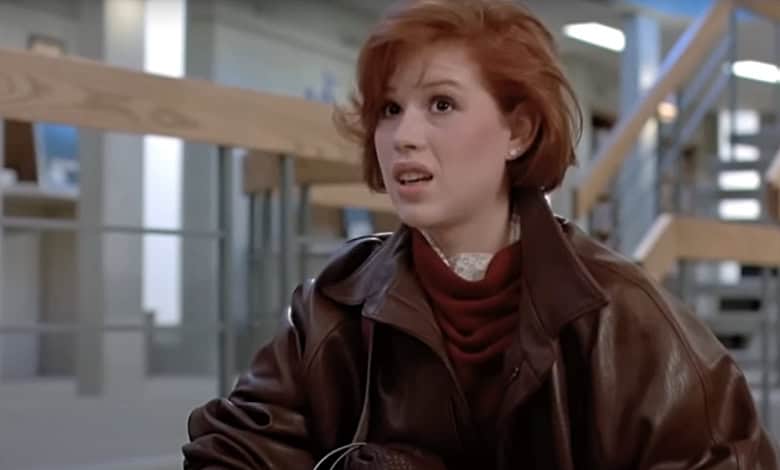There’s one reason we still know the name Molly Ringwald 30-plus years after her first burst of fame.
John Hughes.
Ringwald co-starred in the writer/director’s “The Breakfast Club” (1985) and headlined both “Sixteen Candles” (1984) and “Pretty in Pink” 1986), three seminal films from the Reagan Era.
The now 56-year-old actress has been trashing the Hughes canon ever since. What makes it worse is that Hughes can no longer defend himself or his signature works.
The populist director died in 2009 at 59 from a heart attack.
The actress first lashed out at her own films and, by extension Hughes’ legacy in 2018. Inspired by the MeToo movement, Ringwald slammed several of Hughes’ beloved films for their “problematic” content.
Her target? The resident thug, played by Judd Nelson, in “The Breakfast Club.”
“If attitudes toward female subjugation are systemic, and I believe that they are, it stands to reason that the art we consume and sanction plays some part in reinforcing those same attitudes….”
“Back then, I was only vaguely aware of how inappropriate much of John’s writing was, given my limited experience and what was considered normal at the time. I was well into my thirties before I stopped considering verbally abusive men more interesting than the nice ones.”
She conflates fiction with reality here, forgetting that flawed characters are often fascinating. More importantly, figures on the big screen are allowed to mature throughout the course of a story.
That certainly applied to Nelson’s Bender character.
Ringwald also torched the so-called sexism in “Sixteen Candles” in the same New Yorker essay. She was on more solid ground given how a key character played by Anthony Michael Hall presumably took advantage of a drunk teen without consequences.
Still, Ringwald wasn’t done attacking her biggest hits.
RELATED: HOWARD STERN DIDN’T LEARN JOHN HUGHES’ LESSON
Next, Ringwald complained that she can’t watch her classic movies with her 12-year-old daughter.
“My 12-year-old daughter, Adele, is the most woke individual that you’ve ever met,” Ringwald said. “I just don’t know how I’m going to go through that, you know, watching it with her and saying: ‘How could you do that? How could you be part of something that?’”
Because the films made millions of people happy and they saw themselves in the main characters? Because it put Mommy on the Hollywood map and paid for much of what you enjoy today? Because your pre-teen wokeness will be looked upon as a cultural poison before long and go to your room?
Now, she’s back to bashing Hughes’ films once more. The new wrinkle? His body of work was just too white.
Molly Ringwald on how #PrettyinPink #SixteenCandles and #TheBreakfastClub would need more diversity if remade today: “Those movies are very white and they don’t really represent what it is to be a teenager in a school in America today.” @MiamiFilmFest https://t.co/zADRyU4CfW pic.twitter.com/rrtlQGj4ir
— Variety (@Variety) April 12, 2024
“Those movies, the movies that I am so well known for, they were very much of the time. And if you were to remake that now I think it would have to be much more diverse. And it would have to be, you know, you couldn’t make a movie that white. Those movies are really, really, very white,” Ringwald said.
“And they don’t really represent what it is to be a teenager in a school in America today, I don’t think,” she concluded.
Molly Ringwald, John Hughes and Teen Angst Then and Now
Yes and no.
No – today’s teens deal with Climate Change alarmism, social media confusion and a brand of woke indoctrination their predecessors never experienced.
Yes – teens are still teens. They’re confused, lonely and curious about the future. They struggle with their appearance, friend groups and more. It’s why Hughes’ films never go out of style despite the hopelessly dated music and fashion cues.
The Hughes canon thrived from the mid-80s through the ’90s. Of course those films can’t accurately reflect teen life in 2024.
So why even bring it up?
RELATED: THE VERY BEST MOVIES FROM 1985
The writer/director “got” what it meant to be a young person in America. It may explain why he quasi-retired in his last decade. Perhaps he sensed his connection to young characters wasn’t as robust as before and refused to stain his legacy with sub-par movies.
So why is Ringwald so eager to critique the films that made her famous?
She knows she’ll earn fawning press every time she does it, and that’s exactly what’s happened in mainstream media circles. Plus, it puts her back in the spotlight, no easy feat for a 50-something actress in a youth-obsessed industry.
It’s worth noting that while Ringwald has worked steadily since leaving the Hughes cocoon, none of her recent projects have had the cultural heft of her “racist, sexist” ’80s work.
Maybe that stings most of all.
